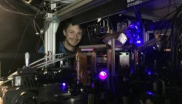Dr. Matthew Norcia, a member of JILA’s extensive alumni network, has been awarded the prestigious 2024 International Union of Pure and Applied Physics (IUPAP) Early Career Scientist Prize in Atomic, Molecular, and Optical Physics. The IUPAP Early Career Scientist Prize honors early career physicists for their exceptional contributions within specific subfields, offering recognition through a certificate, medal, and monetary award.
Norcia was awarded this honor specifically “for his seminal contributions to cavity-QED, optical tweezers, and dipolar quantum gases, specifically, the realization of an optical tweezer clock and of two-dimensional supersolids in dipolar quantum gases,” the IUPAP Committee cited.
Norcia did his Ph.D. work at JILA under the mentorship of Professor James K. Thompson, a JILA Fellow with appointments at NIST and the Physics Dept. at the University of Colorado Boulder. Norcia worked on coupling a large ensemble of strontium atoms to an optical cavity via narrow and ultra-narrow linewidth optical transitions. His thesis, “New tools for precision measurement and quantum science with narrow linewidth optical transitions,” highlighted his work in the first demonstration of a superradiant laser on the one mHz linewidth strontium clock transition, achieving the most accurate and precise active atomic clock ever realized.
During his time in the Thompson group, Norcia also discovered novel laser-cooling methods, thought deeply about how atoms can enable gravitational wave detection, realized new laser spectroscopy methods, contributed to state-of-the-art entanglement generation, and observed cavity-mediated spin-exchange interactions for the first time.
“Matt is simply an extraordinary experimental physicist and is more than deserving of this recognition of his high impact and broad advancements of the frontiers of physics. His myriad achievements have opened many new paths within my group and in many groups around the world,” says Thompson. “For instance, his PhD work is now advancing matter wave interferometers, squeezed optical lattice clocks, and even allowing simulations of physics within BCS superconductors.”
Norcia finished his PhD in 2017 and transitioned into the laboratory of JILA Fellow, NIST Physicist, and University of Colorado Boulder Physics Professor Adam Kaufman.
As a postdoctoral researcher in Kaufman's group, Norcia built one of the first experiments for microscopic control over alkaline earth atoms in optical tweezers, culminating in creating one of the world's first tweezer-array optical clocks.
“Matt’s decision to begin his post-doc in an empty lab was risky, to put it lightly,” Kaufman states. “His exceptional experimental capabilities allowed him to bring a new experiment, in a new area for him, up and running in record time. What’s more, he was able to establish new scientific directions with this apparatus, such as using tweezer arrays for clocks. In just two years, he went from an empty room to multiple high-impact scientific publications. His effectiveness and scientific ingenuity is truly remarkable.”
In 2019, Dr. Norcia left JILA and joined Francesca Ferlaino's team at the IQOQI in Innsbruck, where he advanced the study of dipolar supersolids composed of magnetic lanthanide atoms, particularly extending supersolid properties to two dimensions.
Since 2021, he has been at Atom Computing Inc. in Boulder, Colorado, where he continues to innovate in quantum computing with optically trapped alkaline earth atoms.
Dr. Norcia received the award at the International Conference on Atomic Physics (ICAP) in London in mid-Jul 2024, where he also delivered an invited prize talk.
Thompson notes, “At JILA, we are very proud of our many fantastic alumni, who are impacting the frontiers of quantum science and technology at universities, national laboratories, and at companies. So, it is a real delight to see a JILA alumni of Matt’s caliber receive a prestigious recognition such as this.”
Written by Kenna Hughes-Castleberry, JILA Science Communicator



 The Physics Frontiers Centers (PFC) program supports university-based centers and institutes where the collective efforts of a larger group of individuals can enable transformational advances in the most promising research areas. The program is designed to foster major breakthroughs at the intellectual frontiers of physics by providing needed resources such as combinations of talents, skills, disciplines, and/or specialized infrastructure, not usually available to individual investigators or small groups, in an environment in which the collective efforts of the larger group can be shown to be seminal to promoting significant progress in the science and the education of students. PFCs also include creative, substantive activities aimed at enhancing education, broadening participation of traditionally underrepresented groups, and outreach to the scientific community and general public.
The Physics Frontiers Centers (PFC) program supports university-based centers and institutes where the collective efforts of a larger group of individuals can enable transformational advances in the most promising research areas. The program is designed to foster major breakthroughs at the intellectual frontiers of physics by providing needed resources such as combinations of talents, skills, disciplines, and/or specialized infrastructure, not usually available to individual investigators or small groups, in an environment in which the collective efforts of the larger group can be shown to be seminal to promoting significant progress in the science and the education of students. PFCs also include creative, substantive activities aimed at enhancing education, broadening participation of traditionally underrepresented groups, and outreach to the scientific community and general public.